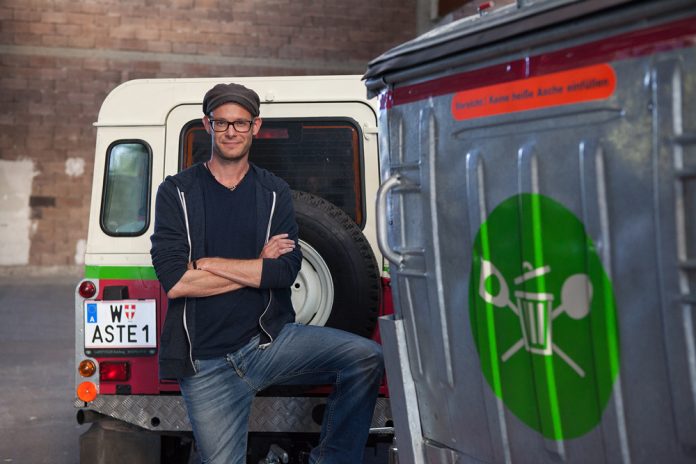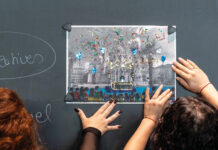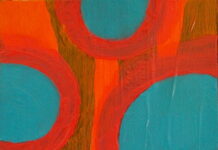
Wastecooking – Fighting food waste and xenophobia with “artivism”
The documentary art film project “wastecooking” by trained chef, filmmaker and “artivist” David Groß focuses and, in an ironic and effective way, shifts our view of global food waste. A change of perspective is also the focus of another project of David Groß: refugee.tv is an online TV channel created by refugees, telling stories from the world from which they have come from their perspective.
Currently, food is being wasted on a vast scale, with onethird of food being thrown away worldwide. In Austria alone, over 150,000 tonnes of edible food lands in the dustbin every year. If you include the figures and definitions of the United Nations World Food Programme, 11% of the world’s population is suffering from chronic hunger. In this light, food waste in the industrial countries is more than just an ethical problem caused by the global trade system. A third of all waste gases that are damaging to the environment are caused by food production. With “wastecooking”, David Groß, who is based in Salzburg, is helping to create awareness of this problem. In his reportage films, documentaries and campaigns in public spaces, the trained chef prepares dishes from thrown-away food and develops his own recipes for ingredients taken from the rubbish bin. In this way, he is communicating the problem of food waste to the general public in a highly effective way. At the same time, “wastecooking” has three demands: that over-production of food be stopped, that rampant consumerism be stopped, and that leftover food is sensibly distributed and cooked in a creative way. For this reason, urban protest practices such as containering, dumpstering and wastediving should be decriminalised and passing on unsellable food to the civil society should become a mandatory obligation, stipulated by the law. “Wastecooking” gives back wasted food its value as a cultural asset, and through its artistic approach shows how to treat such food in a more creative, respectful way.
Food is culture… don’t waste it, cook it!
waste gases that are damaging to the environment are caused by food production. With “wastecooking”, David Groß, who is based in Salzburg, is helping to create awareness of this problem. In his reportage films, documentaries and campaigns in public spaces, the trained chef prepares dishes from thrown-away food and develops his own recipes for ingredients taken from the rubbish bin. In this way, he is communicating the problem of food waste to the general public in a highly effective way. At the same time, “wastecooking” has three demands: that over-production of food be stopped, that rampant consumerism be stopped, and that leftover food is sensibly distributed and cooked in a creative way. For this reason, urban protest practices such as containering, dumpstering and wastediving should be decriminalised and passing on unsellable food to the civil society should become a mandatory obligation, stipulated by the law. “Wastecooking” gives back wasted food its value as a cultural asset, and through its artistic approach shows how to treat such food in a more creative, respectful way. chefs and scientists who are also looking for ways to tackle the global problem of food waste. The journey was documented in a five-part TV series and a full-length film.

A tv channel run by refugees as a means of self-empowerment
Food waste, climate warming, starvation and refugee flows are interconnected global problems whose original contexts and impacts only become visible and understandable when they are seen from a different perspective. And in the same way as David Groß memorably illustrated the theme of food waste in a saturated, well-off society in a subversive, ironic way, so another project initiated by the young man from Salzburg is also designed to make the local effects of a global problem easier to comprehend through a deliberate change of perspective. “refugee.tv” is an online TV project, in which people who have fled to Europe create their own TV programmes under the motto “the other perspective”. To date, the project is unique in Europe. Filmmakers, journalists and camera operators, some of whom made the problems in their homeland public, which is why they had to flee, work together with film teams from Austria. This enables them to continue doing the work they love in their new situation as people who have been forced to leave their country. Here, the goal is a change of perspective. By reporting on their own experiences and current situation, refugees are transformed from objects of media interest to active creators. Bringing their perspective to the social discourse through journalistic activity therefore becomes an act of self-empowerment. Instead of reporting on crises, the focus here is on opportunities, so that those perceived as “other” are regarded as a positive addition, rather than a risk. The reports and documentaries relate not only to subjects that affect the refugees directly, but also offer loving, ironic takes from the outside of the habits and customs of the Alpine region, which can appear extremely strange to people from elsewhere in the world. Media makers from six different countries work together, supported by a four-person team from Austria. In this way, “refugee.tv” is a good example of trans-cultural teamwork and dialogue. Its reports and magazine programmes, as well as an appearance at the media art festival “Digital Spring” have already attracted a broad range of media interest in the project. Since a large number of media professionals who were forced to flee their homes due to their critical reporting have now joined “refugee.tv”, a “MEDIA SUMMIT” was organised for the first time in April 2016. At this first media meeting in Austria for film- and TV programmemakers who have arrived in Europe as refugees, networking and exchange was made possible, and a film workshop was given for young refugees. Through its films and film art, TV formats and performances, “refugee.tv” shows what an important contribution refugees can make to the European media landscape if they are given the opportunity to do so.
David Groß
Filmemacher, Aktivist
wastecooking & refugee.tv
www.wastecooking.com
www.refugee.tv











